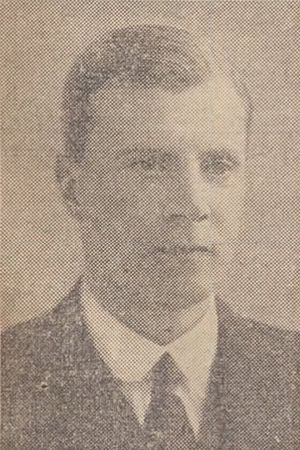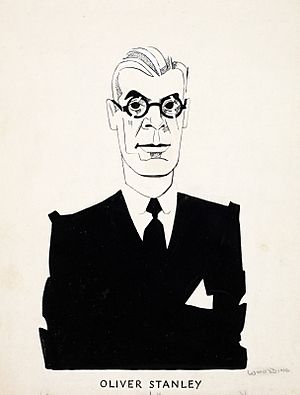Oliver Stanley facts for kids
Quick facts for kids
Oliver Stanley
|
|
|---|---|

Stanley in 1934
|
|
| Member of the British Parliament for Bristol West |
|
| In office 6 July 1945 – 10 December 1950 |
|
| Preceded by | Cyril Culverwell |
| Succeeded by | Sir Walter Monckton |
| Secretary of State for the Colonies | |
| In office 22 November 1942 – 26 July 1945 |
|
| Monarch | George VI |
| Prime Minister | Winston Churchill |
| Preceded by | Viscount Cranborne |
| Succeeded by | George Hall |
| Secretary of State for War | |
| In office 5 January 1940 – 11 May 1940 |
|
| Monarch | George VI |
| Prime Minister | Neville Chamberlain |
| Preceded by | Leslie Hore-Belisha |
| Succeeded by | Anthony Eden |
| President of the Board of Trade | |
| In office 28 May 1937 – 5 January 1940 |
|
| Monarch | George VI |
| Prime Minister | Neville Chamberlain |
| Preceded by | Walter Runciman |
| Succeeded by | Sir Andrew Duncan |
| Secretary of State for Transport | |
| In office 22 February 1933 – 29 June 1934 |
|
| Monarch | George V |
| Prime Minister | Ramsay MacDonald |
| Preceded by | John Pybus |
| Succeeded by | Leslie Hore-Belisha |
| Member of the British Parliament for Westmorland |
|
| In office 30 October 1924 – 5 July 1945 |
|
| Preceded by | Sir John Weston |
| Succeeded by | William Fletcher-Vane |
| Personal details | |
| Born | 4 May 1896 London, England, UK |
| Died | 10 December 1950 (aged 54) Sulhamstead, Berkshire, England, UK |
| Political party | Conservative |
| Spouse |
Maureen Vane-Tempest-Stewart
(m. 1920; died 1942) |
| Children | 2 |
| Parents | Edward Stanley, 17th Earl of Derby Lady Alice Montagu |
| Education | Eton College |
| Profession | Barrister |
Oliver Frederick George Stanley (born May 4, 1896 – died December 10, 1950) was an important British politician. He was a member of the Conservative Party. Oliver Stanley held many important jobs in the government before he passed away at a relatively young age.
Contents
Early Life and School
Oliver Stanley was born in London, England. His father was Edward Stanley, 17th Earl of Derby. His mother was Lady Alice, whose father was the Duke of Manchester. Oliver had an older brother named Edward.
Oliver went to Eton College, a famous school. He planned to go to Oxford University afterwards. However, World War I started, so he could not attend university.
Military Service
During the First World War, Oliver Stanley joined the army. He first served in the Lancashire Hussars. In 1915, he moved to the Royal Field Artillery. He became a captain. He was recognized for his bravery. He received the Military Cross from Britain. He also received the Croix de Guerre from France.
Political Career
After the war, Oliver Stanley became a lawyer in 1919. In 1924, he was elected as a Member of Parliament (MP). An MP is someone elected to represent people in the British Parliament. He represented the area of Westmorland. Later, from 1945, he represented Bristol West.
Important Government Roles
Oliver Stanley quickly became noticed by the Conservative leaders. He held several important jobs in the government during the 1930s.
- As Minister of Transport, he helped introduce new rules. These included a 30 miles per hour speed limit for cars. He also made sure new drivers had to pass a driving test.
- In May 1938, he was the President of the Board of Trade. This job involved looking after business and trade. At the same time, his brother, Edward Stanley, became the Secretary of State for Dominion Affairs. It was very rare for two brothers to be in the government's main group of ministers (the Cabinet) at the same time. Sadly, his brother Edward passed away five months later.
In January 1940, Stanley became the Secretary of State for War. This meant he was in charge of the army. His father had also held this job during the First World War. However, the government changed just four months later. Stanley was then replaced by Anthony Eden.
Later, Winston Churchill, the Prime Minister, offered Stanley another important job. Stanley became the Secretary of State for the Colonies. He held this role until the end of World War II. This job involved managing the British Empire's colonies around the world.
Later Years and Legacy
After the Conservative Party lost the 1945 election, Oliver Stanley helped rebuild the party. He became one of their most important MPs. He also became the head (Chancellor) of the University of Liverpool.
However, his health began to decline. He passed away on December 10, 1950, at his home in Sulhamstead. He was 54 years old. Many people believed that if he had lived longer, he would have continued to hold very important positions in the government. Some even thought he could have become Prime Minister.
Family Life
Oliver Stanley married Lady Maureen Vane-Tempest-Stewart in 1920. They had two children:
- Michael Charles Stanley (1921–1990)
- Kathryn Edith Helen Stanley (1923–2004), who later became a Lady-in-Waiting to Queen Elizabeth II.
Lady Maureen passed away in June 1942. Oliver Stanley died eight years later.
 | Dorothy Vaughan |
 | Charles Henry Turner |
 | Hildrus Poindexter |
 | Henry Cecil McBay |


